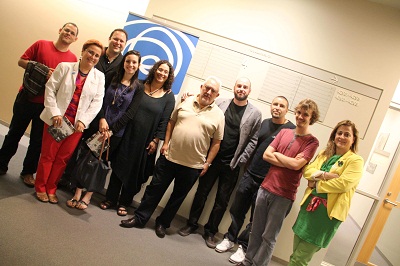basque heritage worldwide

10/08/2012

ADVERTISING
New York, NY. Joxean Fernandez, director of the Basque Filmoteca and guest professor of the Bernardo Atxaga Chair at City University of New York (CUNY), was very pleased with his course on Friday. During five days, from October 1-5, Fernandez offered students an introduction to Basque cinema, and the response was very positive. “It was really short,” was the only complaint heard from the students.
During the course, Fernandez delved into the film of three generations of Basque directors from the 70s until today. He paid special attention to the historic context, “Essential to understand the topics covered in our cinema,” according to Fernandez. “I think that we have sparked interest in Basque film, which I feel is very important,” Fernandez added. The course included an exceptional visit on the last day by director Imanol Uribe who answered students’ questions about his work and Basque film in general.
Laboa’s voice in the Big Apple
Uribe was in New York by invitation of the Etxepare Basque Institute to present two of his films as part of the Basque Cultural Exchange event. The screening took place at the Cervantes Institute and began with Haika Mutil followed by his latest film Honey from Oranges. The event was presented by Javier Rioyo, director of the Cervantes Institute of New York, and Aizpea Goenaga director of the Etxepare Basque Institute. At the end of the screenings, Uribe participated in a discussion on his work along with Paul Julian Smith, a professor at CUNY.

[From left to right, Paul Julian Smith and Imanol Uribe, during the discussion (photo Etxepare)]
In the documentary Haika Mutil (1997) Uribe traces the emotional profile of songwriter Mikel Laboa, supported by a script written by Bernardo Atxaga and the photography of Javier Aguirresarobe. For many spectators this screening was their first contact with the music of one of Basque music’s myths, as well as with the Basque language that they were hearing for the first time. The film Honey from Oranges tells the story of young lovers in the 1950s during the Franco dictatorship.
This week, film and the Civil War
Activities will continue this week with a cycle called “The Civil War and the Basque Country,” that started yesterday at the prestigious Anthology Film Archives. During yesterday’s session the Tree of Gernika (1975) was shown by Fernando Arrabal: Gernica (1950) by Robert Hessens and Alain Resnais and Good News (2008) by Helena Taberna.

[During the first day of the cycle on the Civil War in Euskadi, Joxean Fernandez and Iker Ganuza presented the film “Good News” (photo Etxepare)]
Joxean Fernandez and producer Iker Ganuza were in charge of presenting Helena Taberna’s film and following the screening, Ganuza and Aizpea Goenaga, director of the Etxepare Basque Institute answered questions from the public that were many and varied: the Civil War and Franco’s Dictatorship in the Basque Country, the historic memory, the situation of Basque during that time and today, the difficulties of making movies in Euskaera, shooting and financing film among others.
The cycle will continue this week with films such as Lauaxeta (1987), by J.A. Zorrilla; The Children of Russia (2001), by Jaime Camino and Vacas (1992), by Julio Medem.
-Complete Basque Cultural Exchange – New York Fall 2012 program, here
ADVERTISING
ADVERTISING
ADVERTISING
ADVERTISING
ADVERTISING
© 2014 - 2019 Basque Heritage Elkartea
Bera Bera 73
20009 Donostia / San Sebastián
Tel: (+34) 943 316170
Email: info@euskalkultura.eus